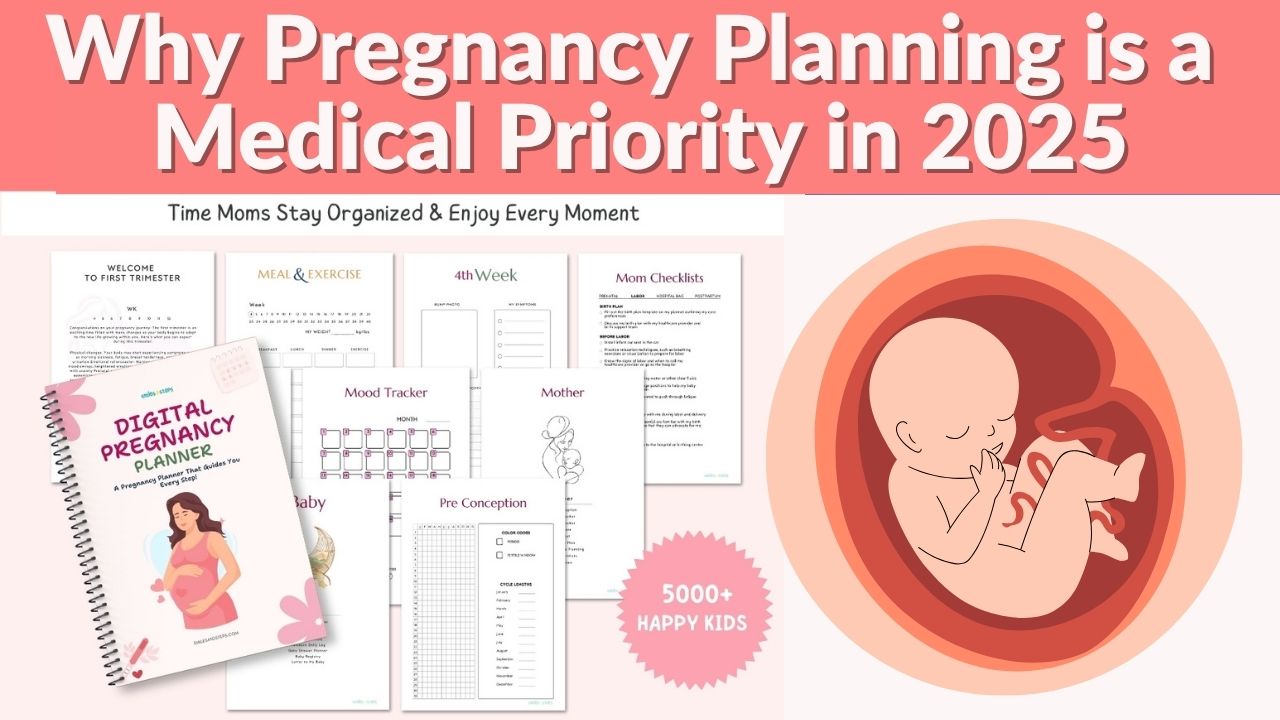In 2025, pregnancy is no longer just a personal journey—it’s a medical mission. With rising maternal stress, advanced diagnostics, and changing healthcare systems, structured pregnancy planning has shifted from “nice to have” to a medical necessity. In this blog, we’ll explore 6 vital aspects that make planning crucial for both mom and baby.
1. Rising Maternal Stress Levels and Their Health Impact
Modern moms face unprecedented pressure—from juggling work to social expectations. Stress isn’t just emotional; it’s biological. High cortisol levels during pregnancy can impact fetal development, immunity, and brain health.
Why this matters:
- Increases risk of premature birth
- Impacts baby’s brain development
- Triggers gestational hypertension
Planning reduces stress by organizing appointments, budgeting, and self-care routines. A planner becomes a therapeutic tool in itself.
2. Lack of Early Risk Detection Without Structured Monitoring
Most complications begin silently—gestational diabetes, anemia, or thyroid imbalances. Regular tracking of symptoms and mood can help spot issues early, before they escalate.
Table: Early Signs and What They May Indicate
| Tracked Symptom | Possible Concern |
|---|---|
| Frequent fatigue | Iron deficiency, anemia |
| Swollen hands/feet | Preeclampsia |
| Mood swings | Hormonal imbalance, depression |
| Excess thirst | Gestational diabetes |
A planner with health and wellness trackers ensures nothing is overlooked.
3. Medical Experts Recommend Structured Trimester Planning
Doctors now advise moms to follow trimester-specific protocols—not only in nutrition but also in physical activity, vaccinations, and mental health. Without structured planning, these milestones are easy to miss.
Key trimester focuses:
- 1st: Folic acid, genetic screenings, nausea management
- 2nd: Anatomy scan, gestational diabetes test
- 3rd: Birth plan, hospital prep, sleep tracking
A well-designed planner aligns perfectly with this medical approach.
4. Preventing Financial and Emotional Burnout Before Birth
Many moms go into delivery mentally and financially drained. Unplanned hospital expenses, last-minute purchases, and emotional overload make labor harder than it needs to be.
Bullet points: Common missed costs
- Hospital parking & food
- Extra ultrasounds or lab tests
- Newborn items like bottles, pillows, etc.
Using a baby budget & expense tracker minimizes surprise costs and supports emotional readiness.
5. Birth Preparedness Reduces Labor Risks and Anxiety
Doctors stress how vital it is to have a clear birth plan and packed hospital bag. In emergencies, every second matters. Unprepared moms may face increased anxiety and even medical errors.
Your plan should cover:
- Pain relief preferences
- Emergency contacts
- Labor positions & preferences
- Hospital bag checklist
Having it all pre-organized reduces panic and empowers confident decisions during labor.
6. Postpartum Health Is Often Ignored Without a Plan
After delivery, moms often neglect their health—physically and emotionally. Doctors now emphasize postpartum care as equally important as prenatal care.
Postpartum priorities:
- Sleep schedule tracking
- Emotional well-being check-ins
- Newborn feeding tracker
- Self-care reminders
With a planner, new moms can gently transition into motherhood without forgetting themselves.
The Solution Every Doctor Would Recommend
If you’re expecting in 2025, structured planning is more than convenience—it’s healthcare. That’s why we created:
Get the Pregnancy Planner
